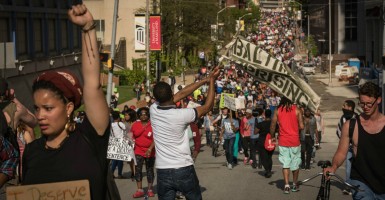BALTIMORE—At the end of the most hopeless of weeks, after Freddie Gray’s tragic death in the custody of police led to violent—and peaceful—protests, and the arrests of six police officers, Pastor Harold Carter Jr. called for unity, peace and revival.
Carter preached for the congregation to use Gray’s memory to keep sight of the opportunity arising in and around the neighborhood: his church’s School of Music is receiving more interest than ever, a state university is expanding nearby and a successful workforce development group was recently championed by President Obama.
“Essentially what’s happening around this church is kind of a renewal,” says Carter, whose West Baltimore church, New Shiloh Baptist, hosted Gray’s funeral. “Granted there are still a lot of boarded up homes, drugs, gangs. But we are seeing some new life.”
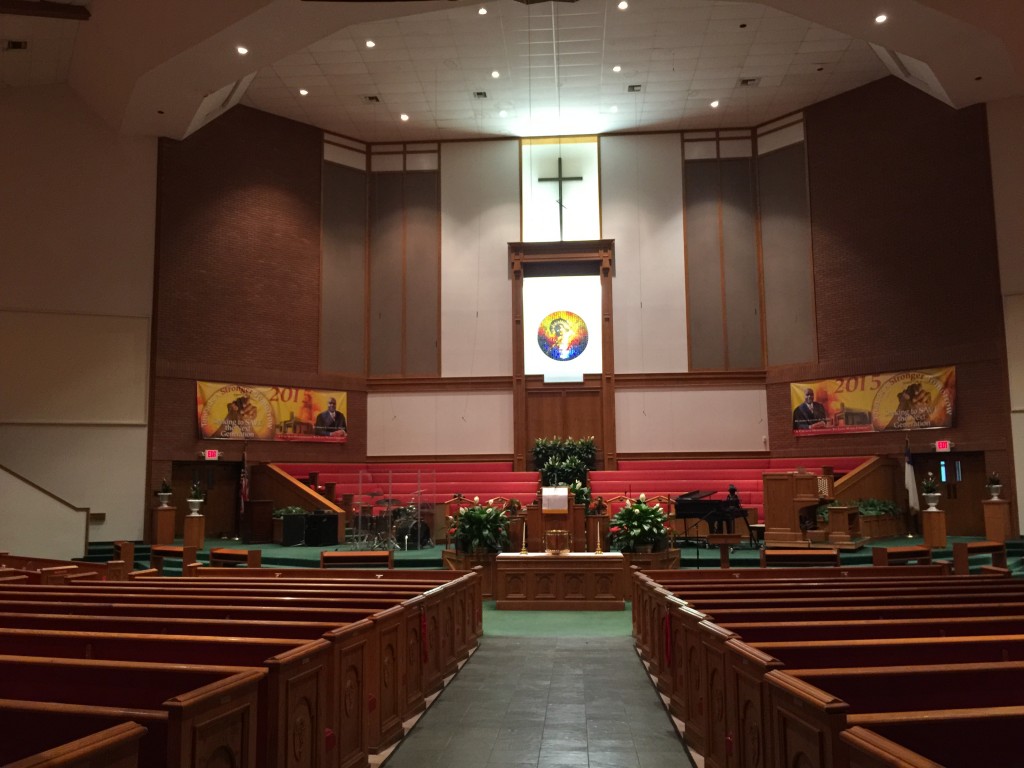
New Shiloh Baptist Church in West Baltimore hosted Freddie Gray’s funeral April 27. (Photo: Josh Siegel/The Daily Signal)
Some four blocks away from the church, Shakeebe McKoy, an East Baltimore resident visiting his nieces and nephews on N. Bentalou Street, described a life devoid of any chance at renewal.
McKoy, bound by a wheelchair and decades of family-passed poverty, can’t keep up with his 5-year-old son, Craig—who navigates tough streets by popping wheelies on his bicycle.
“You have to let him [his son] roam and let him learn on his own,” says McKoy, whose experiences have made him distrustful of the city’s police department and fed up with what he sees as a lack of public investment in his community.
“It’s up to him. He’s always been his own man. If he does slip up, the world ain’t going to feel bad for him. All of this s*** has already been going on. I’m just waiting for another one to come. I ain’t going to say that I hope anything. I’ll just wait to see what it is.”
The different perspectives of Carter, a pastor, and McKoy, a father, were bred in the same place.
A new study by two Harvard professors, published by The New York Times, shows that among the nation’s 100 largest counties, children face the worst odds of escaping poverty in the city of Baltimore. The places that offer greater chances at upward mobility, which include suburban counties like Fairfax, Va.; Bergen, N.J.; and Bucks, Pa., share traits such as having elementary schools with better test scores, greater share of two-parent families and more integration of affluent, middle-class and poor families.
The comments by Carter and McKoy reflect the contradictions of Baltimore, a place where the gleaming Inner Harbor exists just three miles from Sandtown-Winchester, the West Baltimore neighborhood where Gray lived and where police officers arrested him, dragged him in a van and drove him on what turned out to be a deadly ride.
Over two days of interviews, The Daily Signal spoke with a range of leaders, characters and representatives in Baltimore’s black community to understand how its experiences with high unemployment rates, violent crime, incarceration and poor health boiled over after the death of one of their own.
During the visit, the euphoric, but careful, exaltations of Friday—when six police officers were charged with a range of crimes, including murder and manslaughter—gave way to the “prayer and peace” of Sunday.
After that, all that’s left is an uncertain future—and hopeful recovery.
The Pastor
When Carter’s late father decided to build the New Shiloh Baptist Church in West Baltimore 25 years ago, he ignored calls to put the church in the county, outside city lines.
A “certain segment” of people thought the church’s preaching would be better heard to a populace with more hope.
Building off the work of Carter Sr., a product of the civil rights movement who was born in Selma, Ala., and licensed to preach by Martin Luther King Jr., Carter has made it the church’s mission to position the city’s next generation for success.
This year, New Shiloh launched a mentoring program specifically for male teenagers. The church hired a full-time staff member to help young men—mostly from single-parent homes—deal with issues such as peer pressure, self-esteem and self-reliance.
The message is that the African-American community can rise up and make progress on its own.
“We need to continue to promote the message that we are in many ways our own enemy, and that’s the whole black on black crime piece,” Carter said. “We have to find a way to stem black on black crime. That’s our nemesis. Underlying all of that of course is the racial profiling piece—where Freddie was concerned. We need to be about raising up a new generation of African-American young men who have a whole other perspective and see life as valuable.”
But to feel valued, Carter says, public officials can do better to show minority youth that their lives have worth.
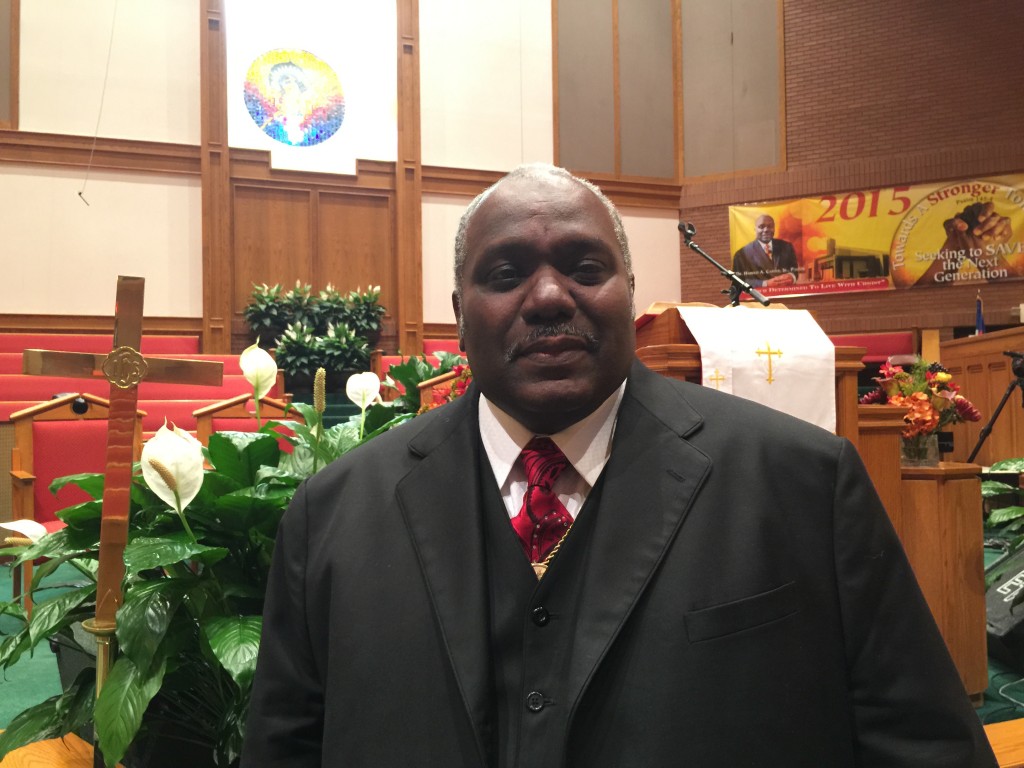
Harold Carter Jr., the pastor of New Shiloh Baptist Church in West Baltimore, called for unity, peace and revival in the wake of the death of Freddie Gray. (Photo: Josh Siegel/The Daily Signal)
Carter lauded a new President Obama initiative to create a new nonprofit organization—spun off from a previous White House program, My Brother’s Keeper—to help address the kinds of problems that led to the unrest in Baltimore.
The initiative, focused on young black and Hispanic men, is designed to raise money for local programs devoted to education, reading mentoring, job training and other efforts.
Carter, in meetings last week with Rep. Elijah Cummings, D-Md. and Baltimore Mayor Stephanie Rawlings-Blake, among others, called for reform of Maryland’s Bill of Rights for police officers. Under the state’s law, Maryland police officers are granted special rights when they are investigated for misconduct, including a provision that gives officers 10 days before they have to talk to investigators.
“I want to believe like so many of the others that change will happen,” Carter said. “You kind of become status quo. But this has been a wakeup call—I think for the community and for others outside the community—to say that we have seen some progress, but it’s been slow. I think this will help to expedite a lot of things. At least, I want to believe it will. You can’t stop believin’.”
The Father
McKoy, a 29-year-old father, doesn’t teach his son, Craig, to believe. To McKoy, believing is passive.
Believing requires hope and trust. Believing won’t get McKoy out of a wheelchair.
McKoy’s brand of parenting is “realistic.” He wants his kindergarten-aged son to be strong, independent and honest. He wants Craig to fight for his worth. He’s pushing Craig to take up an interest in boxing.
He lets Craig roam on his bike alone, risking him to wheel into trouble, because that’s how he will find what’s right.
That doesn’t mean McKoy doesn’t care. In the next breath, McKoy barked at his young niece as she biked near oncoming traffic, before demanding the girl to return to the family’s row house.
“I teach my kid to be honest with me,” McKoy said. “I want to break the lies out of him. Just as long as he keeps it real, he’ll be alright.”
McKoy puts on a tough figure, but he worries. Like others who The Daily Signal spoke with, McKoy criticized his neighborhood for not providing enough recreation outlets.
“Put stuff out here so there’s stuff to do,” McKoy said. “There ain’t nothing to do, so it’s straight trouble. We need more rec centers, more parks. It’s hard to keep them out of trouble. That’s what I’m scared of.”
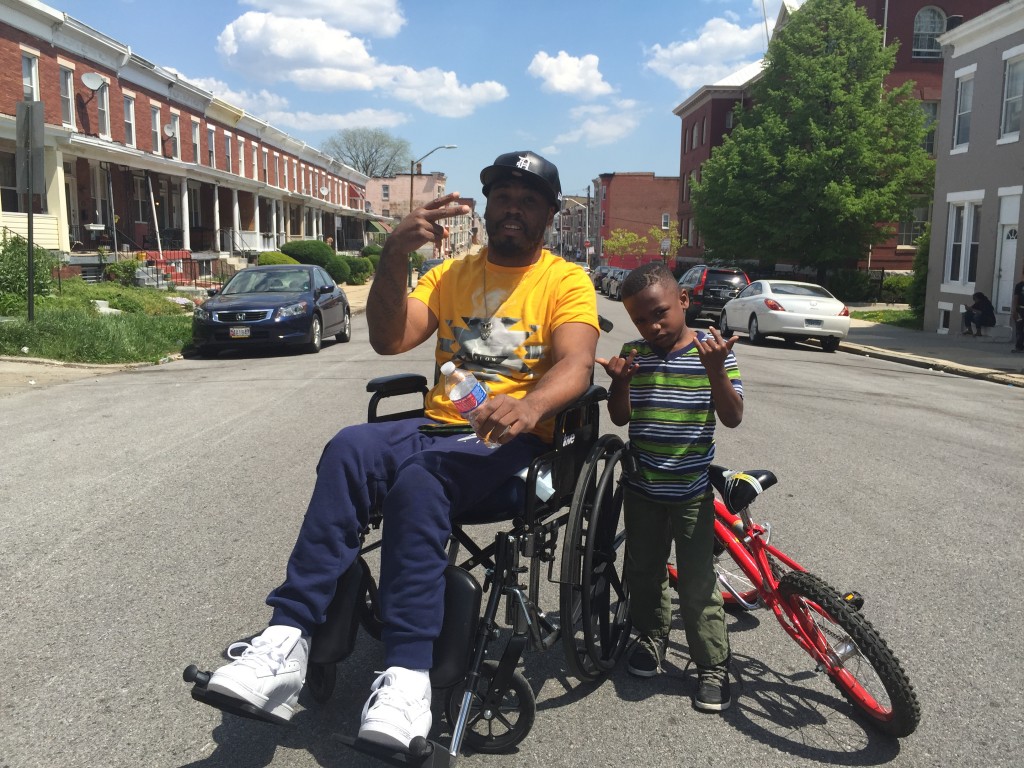
Shakeebe McKoy, an East Baltimore resident visiting his family in West Baltimore, imparts a “realistic” brand of parenting on his young son, Craig. (Photo: Josh Siegel/The Daily Signal)
Twenty-nine years of life in Baltimore’s streets have tought McKoy not to fear for himself.
McKoy’s life “is already what it is.”
As much as he acts like he doesn’t, McKoy looks out for his son, so he won’t have to make it alone.
“We need to change it for them—for people 18 and under,” McKoy said. “I’m already here. I’m still going to be smoking weed, collecting social security checks, and be in a wheelchair. It’s all about making it better for him.”
The Grandmother
Ada Norris is “grandma Ada” to N. Bentalou Street.
She’s lived in the same row house for 37 years, where she uses her front porch as a perch to patrol the neighborhood for kids getting into trouble—and to offer a hand to those who deserve it.
“There’s nobody teaching kids the fundamentals of life,” says Norris, a widow, mother, grandmother and retiree from the city of Baltimore’s Department of Parks and Recreation. “We have to look out for each other.”
Because nobody else will, Norris injects the same tough love mentoring into the neighborhood’s youth as she did to her own children and grandchildren.
“Fool,” Norris mutters from her porch as a car bumping with loud music and shiny rims speeds by on N. Bentalou Street. Another driver, moving at Norris’ preferred speed, waves at her. “Hey sugar, hey baby,” Norris sings back.
“There is so much stuff that goes on,” Norris says. “People are afraid to speak up because of retaliation. I’m not afraid. You’ll get hurt if you come to me. You have to have respect. If you don’t have respect, you won’t have no job. When I see something that’s not right, I say, ‘Baby that’s not right.’ Everybody knows me.”
Norris’ style works. Her four children have all made it out of the house, and she has two grandchildren in the military and another in the reserves.
But Norris believes that conditions in her West Baltimore neighborhood have changed to make it harder for young people to get out.
“It’s not like it was,” Norris says. There’s nothing for our kids to do. There’s nowhere for them to relieve anything.”
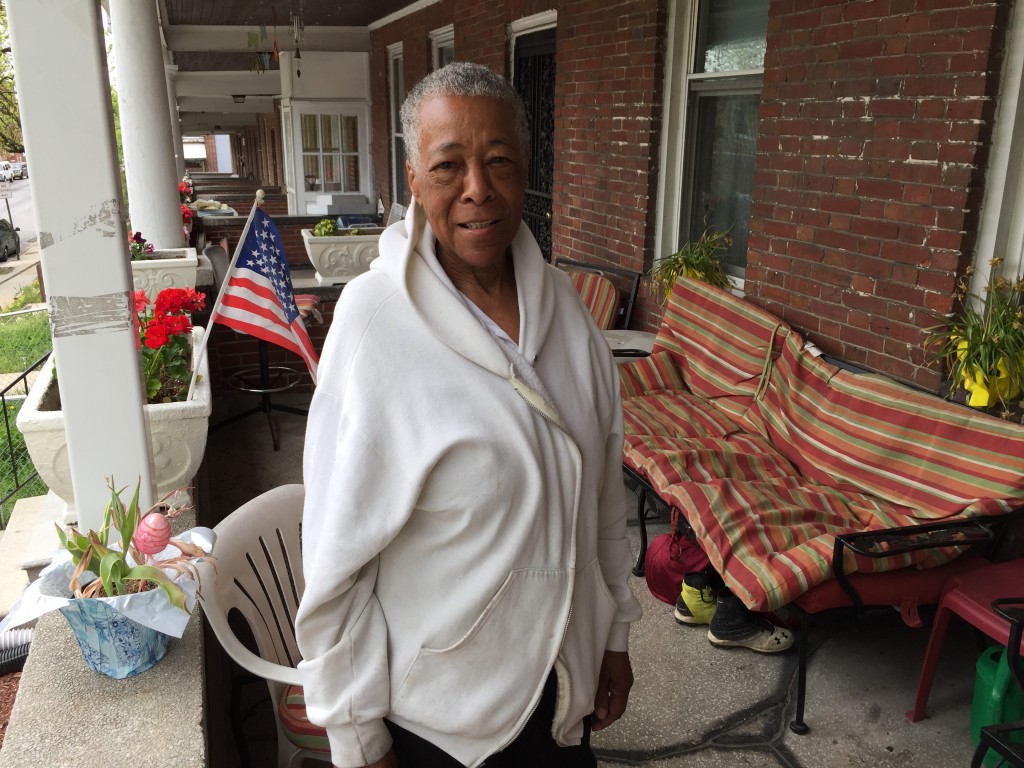
Ada Norris is the neighborhood grandmother to her West Baltimore community (Photo: Josh Siegel/The Daily Signal)
Like McKoy, Norris decried what she sees as a lack of recreation centers near her neighborhood. The ones that do exist, she says, don’t do enough outreach.
“Recreation teaches leadership and how to communicate,” Norris says, noting that she wishes the city of Baltimore, which has been under Democratic control since 1967, did a better job communicating with residents. “And those skills are missing from both ends. We need better communication with police and with politicians. We only see the politicians when they want to get voted into office.”
Norris turns grandmotherly again. Before young people can be active, go to school and earn a job, Norris says, they need to get off drugs.
She says that drugs are taking over neighborhoods, creating fear and mistrust between the police and populace.
Like others who spoke to The Daily Signal, Norris spoke of narcotics officers, called “knockers” by people in the neighborhood, harassing young black men.
“When I was growing up, police would be waving in the street, doing it by feet,” Norris said. “Now they are in their patrol cars. We have to trust each other, and to do that we need to interact not just when an arrest happens.”
The Volunteer
Eric Simpkins, an out-of-towner volunteer, is here to provide an outlet for community interaction.
For four afternoon hours every week day, Simpkins, supervises some 30-50 neighborhood children at the Easterwood Park Recreation Center, located just down the road on N. Bentalou Street.
The “T” on the Easterwood sign attached to the center is chipped and crooked, and Simpkins hurries to pick up trash outside the building before a reporter takes a photograph.
That’s okay though. Simpkins is just happy the center is up and running. It was closed for three years due to lack of funding, Simpkins says, and reopened in 2012. It’s now operated by Omega Baltimore, a branch of the Omega Psi Phi fraternity, working in conjunction with the city of Baltimore’s Department of Parks and Recreation. Outsiders are taking notice of the revival. In 2013, Under Armour paid to redo the basketball courts outside the recreation center.
“I think about the impact we can make if we can just reach a few of these kids,” Simpkins says of the recreation center, which offers a computer lab, pool tables, a meal, snacks and a place to do homework. “We are giving them an opportunity that wasn’t here a few years ago. We need to give the kids something to do. We know the crime rate is up around here. It’s a prime location. What can we do?”
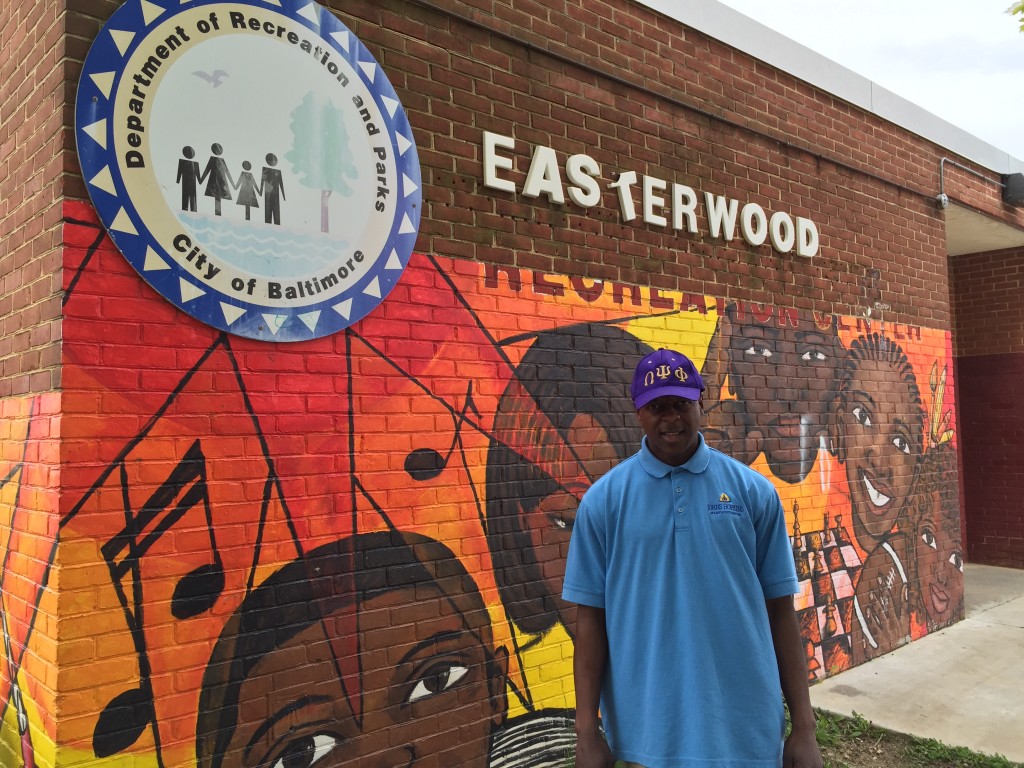
Eric Simpkins is a volunteer at Easterwood Park Recreation Center in West Baltimore, near where Freddie Gray grew up. (Photo: Josh Siegel/The Daily Signal)
After the sometimes violent protests that erupted in the wake of Gray’s death, Simpkins and the center’s other staff were there to talk children through it.
He had to balance sensitivity with firmness, explaining to confused kids the difference between peaceful and violent protests.
“We tell the kids it’s all about respect,” Simpkins says. “You have to respect authority. We have rules posted up in here. You have to respect your elders. Whether it comes from their parents or us, they have to know that.”
Simpkins moved from South Carolina to Baltimore to pursue his MBA. His path is the perfect model for children in need of one.
“You can be a teacher, a lawyer, a doctor,” Simpkins says. “If you get one kid to make it, they see it and are impressed by it and they want to do better. It doesn’t matter about your condition and where you go home at night. What do you want to do? The sooner you can figure out what you want to do in life, the sooner you can do it.”
The Student
Tom Scott is on the path to becoming who he wants to be.
Scott is a student at Baltimore City Community College who aspires to be a physical education teacher.
He’s here because of “encouragement” from people who know him, friends and family who shield him from drugs and gangs and point him to education.
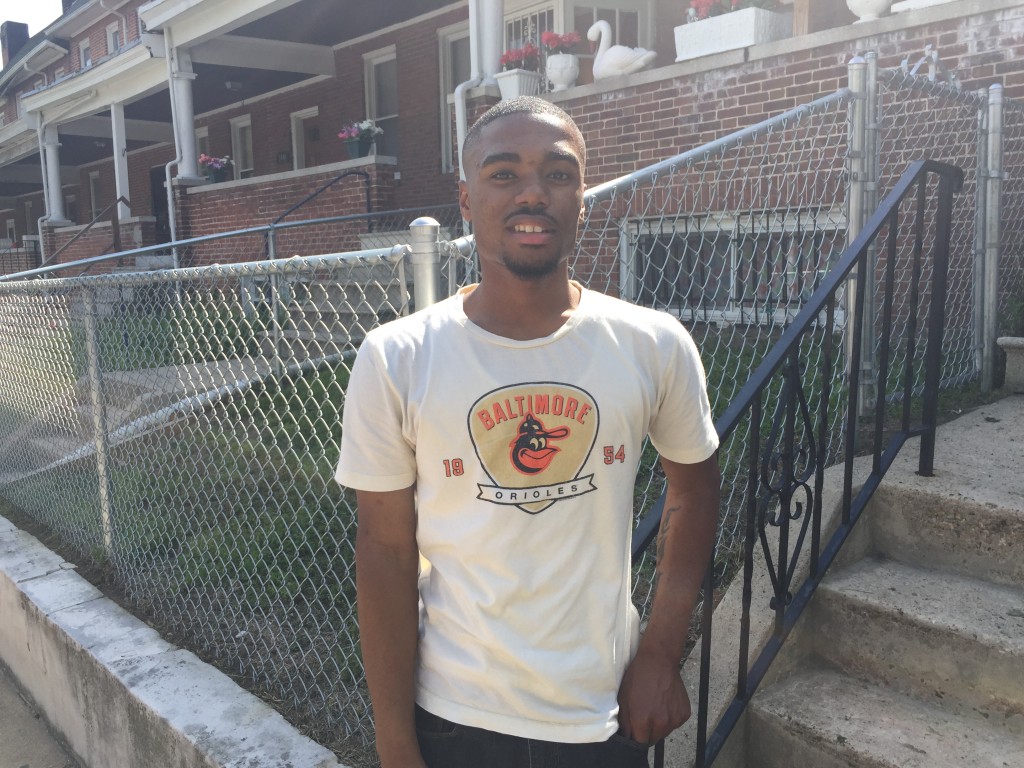
Tom Scott, standing in his West Baltimore neighborhood, is a community college student who aspires to be a physical education teacher. (Photo: Josh Siegel/The Daily Signal)
He’s here despite “misconduct” from people who don’t know him, from the police who are supposed to patrol his neighborhood for bad actors—people Scott would never emulate.
“The police don’t all do their jobs right,” Scott says. “They go around whole blocks sometimes wanting to lock somebody up to lock somebody up. I was coming from the store where I worked one time last summer and the police checked me for no reason. I had my earphones in minding my own business. It was shocking and unexpected.”
The police did not arrest Scott that day. Free of any shackles, Scott intends to chase his dreams.
“Older people need to reach out to young people and encourage them,” Scott says. “Everybody needs to work together. We need to police ourselves.”






























